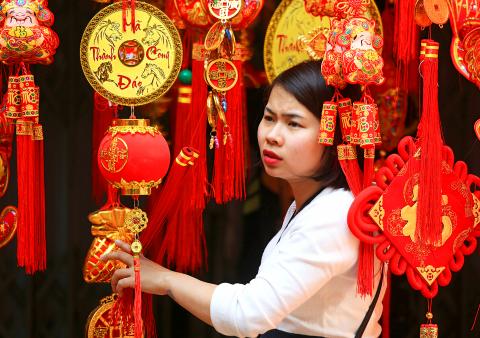There is no cat in the Chinese zodiac. There is one in the Vietnamese one, though. Vietnam inherited the zodiac and the lunar calendar from the Chinese, who ruled it for a millennium a millennium ago. They replaced the rabbit with a cat.
The Vietnamese believe there are 12 sacred animals from the zodiac, and these take turns supervising earthly affairs. Lunar New Year’s eve sees the animal overseeing the old year end its term and hand the baton to the new animal. This year, for the Vietnamese — as for the Taiwanese — is the Year of the Rooster.
Although Vietnam has followed the Gregorian calendar since 1954, the traditional lunisolar calendar, mostly based on the Chinese lunar calendar, is still used to observe lunisolar holidays and commemorations, Tet being one of them.

Photo: AP
照片:美聯社
Tet Nguyen Dan — Tet for short — is Sino-Vietnamese for “Feast of the First Morning of the First Day”. It is Vietnamese New Year’s Day, falling this year on Jan. 28, the arrival of spring, and the most important celebration in Vietnamese culture. The final day of the old year is about preparing food to offer to the ancestors. The actual dishes differ, depending on the climates of the northern, central and southern parts of the country.
The Vietnamese also believe that the new year’s first visitor determines the fortunes of the family for that year. It is very important that you don’t visit a family on that day unless invited. Sometimes, the owner of the house pops outside a few minutes before the clock strikes the midnight hour, and then returns a few minutes into the new year. That way, the year’s first visitor is at least presentable.
(Paul Cooper, Taipei Times)
中國的生肖裡沒有貓,但是在越南的生肖中卻有貓。越南曾受中國統治了一千年,直到一千年前才擺脫中國統治。越南繼承了中國的十二生肖和農曆,但他們用貓取代了兔子。
越南人相信黃道十二宮有十二個神聖的動物,這些動物輪流掌管人間事務。在除夕夜送走掌管舊年的動物,並交棒給下一任動物。今年越南和台灣一樣是雞年。
雖然越南自一九五四年起便改採公曆,但其主要本於中國農曆的傳統陰陽曆,仍然用來過節日和紀念日,Tet便是其中之一。
Tet Nguyen Dan- — 簡稱Tet — 在越語中意謂「第一天的第一早的盛宴」。今年一月二十八日是越南的春節,是慶祝春天的到來,也是越南文化中最重要的慶典。越南人在舊年的最後一天準備食物來供奉祖先。實際上供奉的菜餚則根據國家北、中、南部各地的氣候而有所不同。
越南人也相信,新年的第一個訪客決定了那一年家裡的運氣。所以請千萬記住,除非你受到邀請,否則不要在新年的第一天到訪一戶人家。有時屋主在午夜前幾分鐘出門,然後在時針超過午夜幾分鐘後再回到家。這樣,今年第一位來訪的起碼是個像樣的人。(台北時報編譯林俐凱譯)

A: Hard rock band Guns N’ Roses is touring Taiwan tomorrow. What about pop diva Lady Gaga? B: Unfortunately, Singapore has once again exclusively secured Gaga’s concerts in Asia, just like Taylor Swift’s exclusive Asian shows last year. A: The Singaporean government reportedly paid up to US$2.2 million to secure Swift’s shows. B: And the shows did boost its economy and tourism. A: But I’m angry about this approach, so I’m not going to Gaga’s shows this time. A: 硬式搖滾天團槍與玫瑰明天即將來台,流行天后女神卡卡呢? B: 真可惜,新加坡再度取得卡卡亞洲巡演的獨家主辦權,就像去年泰勒絲的亞洲獨家演出一樣。 A: 據報導新加坡政府付出高達220萬美元,取得泰勒絲的亞洲獨家主辦權。 B: 而她的秀也的確提振了該國的經濟和旅遊業。 A: 但我對此還是很不爽,所以不去新加坡看卡卡了! (By Eddy Chang, Taipei Times/台北時報張迪)

A: Hard rock band Guns N’ Roses and pop diva Lady Gaga are finally touring Asia again. B: Are they also coming to Taiwan? A: The band will stage a show at the Taoyuan Sunlight Arena on Saturday. B: Wow, so this will be the band’s third visit. I really love its 1992 power ballad “November Rain.” The nine-minute hit was the Billboard chart’s longest song at one point. A: Let’s go celebrate the 40th anniversary of its release. A: 硬式搖滾天團槍與玫瑰、女神卡卡終於再度展開亞洲巡演了。 B: 他們也會來台巡演嗎? A: 槍與玫瑰本週六即將在桃園陽光劇場開唱唷。 B: 哇這將是該團第三次來台演出,我超愛他們1992年強力情歌《November Rain》,全長近9分鐘還曾是告示牌排行榜最長神曲。 A: 那我們一起去慶祝該團出道40週年吧! (By Eddy Chang, Taipei Times/台北時報張迪)

Bilingual Story is a fictionalized account. 雙語故事部分內容純屬虛構。 Emma had reviewed 41 resumes that morning. While the ATS screened out 288 unqualified, she screened for AI slop. She could spot it a mile away. She muttered AI buzzwords like curses under her breath. “Team player.” “Results-driven.” “Stakeholder alignment.” “Leveraging core competencies.” Each resume reeked of AI modeling: a cemetery of cliches, tombstones of personality. AI wasn’t just changing hiring. It was draining the humanity from it. Then she found it: a plain PDF cover letter. No template. No design flourishes. The first line read: “I once tried to automate my

Every May 1, Hawaii comes alive with Lei Day, a festival celebrating the rich culture and spirit of the islands. Initiated in 1927 by the poet Don Blanding, Lei Day began as a tribute to the Hawaiian custom of making and wearing leis. The idea was quickly adopted and officially recognized as a holiday in 1929, and leis have since become a symbol of local pride and cultural preservation. In Hawaiian culture, leis are more than decorative garlands made from flowers, shells or feathers. For Hawaiians, giving a lei is as natural as saying “aloha.” It shows love and